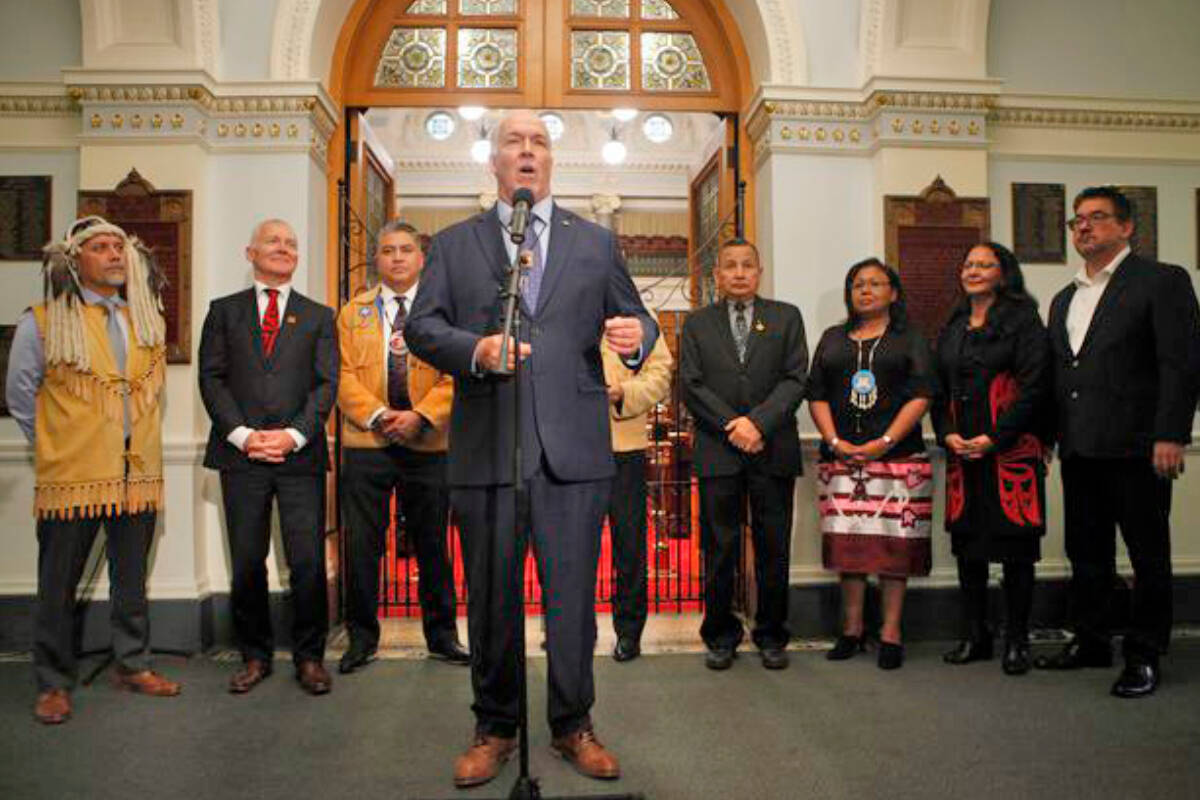B.C. has unveiled a five-year action plan on implementing the UN Declaration on the Rights of Indigenous Peoples (UNDRIP), including tangible actions developed in partnership with First Nations and Indigenous organizations.
Engagement for the plan began in January 2020. The government held over 80 meetings with 75 Indigenous partners and received 30 written submissions to form the framework for the plan. Billed as a “province-wide, whole of government approach”, the action plan addresses a number of issues to improve the lives of Indigenous People and First Nations in B.C.
READ MORE: B.C. to be first to implement UN Indigenous rights declaration
The plan has four themes: self-determination and the inherent right to self-government, title and rights of Indigenous people, ending Indigenous-specific racism and discrimination, and social, cultural and economic well-being.
From 2022 to 2027, B.C. has committed to: complete agreements that recognize Indigenous self-government and self-determination, better support financially the operation of Indigenous governments, establish a secretariat to guide and assist government to meet its obligation under UNDRIP and issue guidelines for civil litigation involving the rights of Indigenous Peoples against the province.
READ MORE: Ottawa commits $8.9M to support B.C. Indigenous justice strategy
To address racism, the province has committed to conduct an external review of Indigenous-specific racism and discrimination in public schools and create a strategy, including resources and support, to address the findings. As well, the province reiterated its previous plan to implement mandatory course credits in Indigenous studies as a requirement for graduation from the K-12 school system.
The government will also prioritize the implementation of the First Nations Justice Strategy to reduce the overrepresentation of Indigenous People in the justice system.
READ MORE: Indigenous-focused coursework to be a high school graduation requirement in B.C.
There are 89 actions detailed in the plan and the government said they intend to initiate each action within five years.
Progress on actions and outcomes outlined in the plan will be tracked in a publicly available annual report. The report will be prepared in consultation with Indigenous people and submitted to the B.C. Legislature by June 30 each year.
The province said that the action plan will be “comprehensively updated” within five years.
The plan is the first of its kind for Canada and is one of few pieces of legislation in the world that creates a plan to enact UNDRIP.
READ MORE: Indigenous Peoples Day must be a ‘call to action’, says Assembly of First Nations chief
Stewart Phillip, Grand Chief and President of the Union of British Columbia Indian Chiefs, heralded the plan as a promise of true reconciliation and transformation but cautioned that those promises would need to be delivered by the government.
“Make no mistake, there have been and there will continue to be numerous obstacles that challenge the work being done to revolutionize and rebuild a relationship that has long been mired in colonial violence and discrimination.”
“We must reflect on the processes, frameworks and institutions that continue to deny the Title and Rights of First Nations, enact tremendous harm upon our communities and perpetuate a colonial cycle of marginalization and violence,” Phillip said. “We must hold our governments and those in positions of power accountable for their actions and their commitments to the Declaration Act.”
Speaking at a news conference on Wednesday, March 30, B.C. Premier John Horgan faced questions about his government’s commitment to implementing UNDRIP. The province is currently in court disputing a land claim from the Nuchatlaht First Nation. Lawyers for the province are arguing that the Nuchatlaht do not have First Nations title rights to Nootka Island on B.C.’s west coast.
READ MORE: B.C. government disputes land claim by First Nation on Vancouver Island
Horgan declined to comment on the case specifically as it is before the courts, however, he said the courts are the “last recourse” when there are disagreements between the province and First Nations. He highlighted an agreement with Blueberry River First Nation that recognized their title rights while allowing resource extraction projects to continue on their territory as all parties work out a settlement agreement.
Asked what he hopes British Columbians will take away from the new action plan, Horgan said he hopes people will take some time to reflect on the colonial history of B.C. and Canada.
“Aside from the Indigenous peoples present today and those around British Columbia, all of us came from somewhere else and we are on territory that was unceded when we arrived… Those who are tuning in today and learning about the Declaration Act and the UN Declaration on the Rights of Indigenous People, I hope they’ll reflect on the benefits all of us have living in this spectacular place.”
@SchislerCole
cole.schisler@bpdigital.ca
Like us on Facebook and follow us on Twitter.

